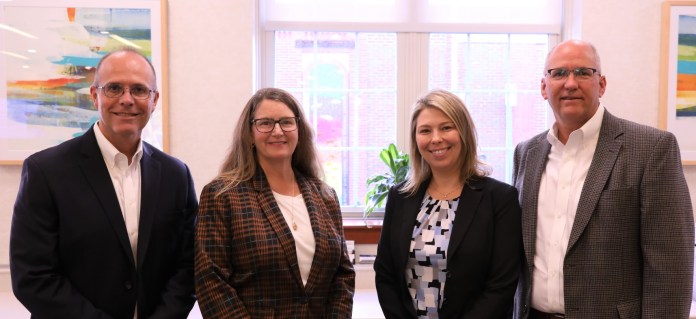The Hopkinton-based nonprofit sees extraordinary rise in demand following the COVID pandemic, now serves more than 15,000 monthly
In 2016, Kate Sanetra-Butler moved to the US from Australia with her husband and two young children. While on a sightseeing trip in Boston she experienced a life-changing encounter with a homeless woman in Copley Square. The woman approached her and asked for a tampon. Sanetra-Butler directed her to a nearby public restroom, where in Europe menstrual care products are often available for free in public restrooms. She was shocked to learn that this isn’t the case in the United States.

“How could I be in one of the busiest places in Boston, next to church, a public library, and successful businesses, and this woman had no access to the care she desperately needed,” said Sanetra-Butler.
As she investigated she realized there is a serious period poverty problem in the US. According to a 2021 report from the Alliance for Period Supplies, 1 out of every 4 menstruating youth has missed school during their menstrual cycle due to lack of access to menstrual products and resources.
Sanetra-Butler took action, laying the groundwork for what would become Dignity Matters. She started collecting period products in her basement and garage, and very quickly realized the enormous challenges that lay ahead.
Menstrual care is out of reach for many
The first, and most obvious problem is that period products are expensive. In fact, pads and tampons are 25% more expensive in 2022 than they were in 2021. According to the National Organization for Women, the average cost of menstrual products is $20 per cycle as of January 2021. For many women, this is simply out of reach.
The second problem is the lack of donations. Few people are aware of this issue, so they do not often think to donate menstrual care products to food pantries, homeless shelters, and other places that meet women and girls in need.
The third issue is that there is no federal or state program that allows women to purchase these items. Menstrual care products cannot be purchased with SNAP (commonly known as food stamps) or WIC (Women, Infants, and Children) benefits. Without that support, many women simply cannot afford to purchase menstrual care products.
Local Beginnings and the Pandemic Effect
Sanetra-Butler began by contacting three homeless shelters and a few schools in Greater Boston. She realized that the most efficient and effective way to support women and girls would be to work with the organizations that were already supporting them and that had gained their trust. This became the model for how Dignity Matters operates today; every woman they serve receives products through a food pantry, homeless shelter, school, or an after-school program.
The organization grew steadily from there, and by March 2020 they were supporting 4,000 women every month. But the COVID-19 pandemic was an inflection point. Just 3 months later they were supporting an astounding 8,500 women and girls. Many of the families had been living paycheck-to-paycheck prior to the pandemic, often in low-wage hourly service jobs. Those jobs disappeared almost overnight. Today Dignity Matters supports more than 15,000 people each month, and distributed more than 2.9 million products in 2022.

“We didn’t realize it, but when we hit 4,500 women each month, that was just the tip of the iceberg,” said Meryl Glassman, Director of Development for Dignity Matters. “And even though we’re supporting about 15,000 now, that’s still half the need in Eastern Massachusetts alone.”
It’s not just homeless women and girls that Dignity Matters supports. The largest source of growth the organization has seen is in women and families that are already supported by a local food pantry. They are housed; indeed, only 30% of their clients are homeless. Many are single mothers working multiple jobs. Some are immigrants, and some have lived in the US for a long time.
“A lot of these women make the same calculation in their mind every month: ‘Can I afford to buy tampons today? Or do I need that money to buy a pair of socks for my child?’,” said Glassman.
Moving beyond menstrual care
In her conversation with shelters, Sanetra-Butler learned that not only did women not have access to menstrual care, they often lacked underwear and bras too. Without underwear it is impractical to use menstrual products, so she expanded Dignity Matters to care for women and girls with those products too.
“You can manage your period without a bra, but we are in the business of helping women build their confidence and being able to live their lives without physical barriers,” said Glassman. “Many women are not comfortable leaving their homes without a bra, or going to a job interview. Some women cannot physically function without one.” Today, 25% of Dignity Matters’ clients receive bras, and in many cases, their first bra in the correct size.
Local Support and Growing Global Awareness
Here in Hopkinton, Dignity Matters supports 130 women and girls with monthly menstrual care through Project Just Because. They also support women residing in Hopkinton through the Voices Against Violence Domestic Violence Shelter (whose MetroWest location is not disclosed to protect its residents).
Around the world, governments are taking notice. In 2022, Scotland became the first country to offer tampons and pads for free. Others, including New Zealand and Kenya distribute period products in schools. Although legislative action at the federal level seems far off, there is hope closer to home. In Massachusetts, the I AM bill would provide access to free period products to all menstruating individuals in schools, shelters & prisons. The bill was introduced in 2019 and passed the Senate in 2022. It is unknown if it will reach the House floor this year.
Reaching students where they are
Early on, Dignity Matters made a big push into schools, where the need is acute. Today they support public school students in Boston, Cambridge, Lowell, Lawrence, Framingham, Natick, and Worcester. They partner with Catie’s Closet to set up a small shop in a classroom, where students can access the clothing and products they need but can’t get elsewhere. Catie’s Closet now helps more than 80,000 children each day, making a measurable difference in attendance and test scores.
“Schools provide toilet paper for all students, but they do not provide menstrual products,” said Glassman. “It is one of the most common misconceptions we hear.”
Purchasing Power
One of the big advantages Dignity Matters has is their purchasing power. Because of their volume, they have been able to negotiate advantageous contracts with menstrual product manufacturers, and this allows them to stretch their funds. A spend of $20,000 to purchase 100,000 products through a unique wholesale contract allows them to purchase pads at 20% of retail price. This provides an entire year of monthly menstrual care for 416 women.
A volunteer army
Like many nonprofits, Dignity Matters thrives because of the dedication of their volunteers, and there is no lack of work to be done. Every one of their products has to be counted, sorted, packaged, labeled, and distributed. While all underwear donated must be new in package or with tags, bras are often donated used and must be cleaned and inspected for quality. For those products, the guideline is clear: They won’t distribute a product that they wouldn’t wear themselves. So if a donated item is ripped or stained, it will be sent to a textile recycler. Corporate donors help too, often organizing volunteer service days for their employees.
In Hopkinton, dedicated volunteers like Nancy Baker-Fowler, Maureen Belger, and Mary Krattenmaker keep the engine of the organization running.


The Town of Hopkinton has provided Dignity Matters with Marathon bib for the last 4 years, and with it they have raised almost $20,000. This year’s runner, Chloe Riven, has already raised 45% of her $5,000 goal.

Recognition
Awareness of the impact Dignity Matters is making is growing. In 2022, the Middlesex Savings Bank Charitable Foundation recognized Sanetra-Butler, naming her the John R. Heerwagen Award recipient. Dignity Matters is using the one-time grant of $20,000 to purchase 100,000 products.

“I am humbled and thankful to be selected for this award and to be recognized for my leadership in fighting period poverty in Massachusetts,” said Sanetra-Butler. “As I stop and reflect on the incredible number of women we have helped, I believe our success boils down to staying focused on our core mission and creating a scalable and efficient operation based on strong logistics and lean management. By pairing this with the time, energy and support the team, volunteers and donors gave, we’ve built an organization and a model of support that we can all be proud of.”
Getting Involved
There are many ways to support in this incredibly important organization. They are always looking for volunteers (sign up for a shift in the warehouse at their VolunteerHub page), or consider purchasing products that will be sent directly to their warehouse. If you have products and want to drop them off, there are many drop-off spots around Greater Boston, or at St. John the Evangelist in Hopkinton, or simply donate funds. A $50 donation will provide a woman with a year of menstrual care and underwear.






